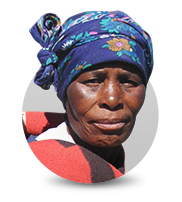HIV/AIDS in Lesotho
Everyone in Lesotho is either infected or affected by HIV/AIDS.

The Prevalence
Lesotho has the second highest HIV prevalence rate in the world – more than 23 % of people, or just under one in four people in the country are living with HIV. In 2009 there were around 23,000 new HIV infections and approximately 14,000 people died from AIDS. Over half of the 260,000 adults living with HIV in Lesotho are women. There are currently more than 200,000 orphans in Lesotho, most of whom are AIDS orphans.
The Impact
The AIDS epidemic in Lesotho has had a devastating impact on the country, its economy, social structure and capacity of families to care for themselves. Crippling poverty combined with AIDS has caused average life expectancy to drop to 49 years. The impact on individuals, families and the whole nation is being felt as adults become too sick to work and children orphaned by AIDS are left to run households.
Fear and confusion surrounding HIV/AIDS, coupled with gender inequity in relationships, has resulted in increased infection rates and teenage pregnancy among orphans and vulnerable children (OVC). The devastation of the social structure in Lesotho from the AIDS epidemic has left a huge cohort of children increasingly vulnerable and alone, especially in rural Lesotho. They lack essential psychosocial support and life skills training required to develop into responsible adults.
The Challenge of Statistics and Reporting on Complex Issues
Those interested in the various statistical indicators of the impact of HIV/AIDS on the people of Lesotho will find that there is some variance in the reporting numbers. You will also find a difference in the statistics of location, if available. For example, Help Lesotho works in northern and central Lesotho. HIV rates vary and are much higher in rural areas where Help Lesotho works, such as Thaba Tseka and Leribe, than the capital city for instance. When looking for reliable statistics to describe the situation in Lesotho, note the dates of the data collection and the source. Lesotho is a small country and not included in some reporting. Reliable sources, though they do not always agree, include:
World Health Organization
UNDP Human Development Report
UNICEF
On the basis of the Human Development Index (HDI), between 1980 and 2011 in Lesotho:
- Life expectancy at birth decreased by 5.6 years and currently stands at 48.2 years;
- Mean years of schooling increased by 2.2 years;
- Expected years of schooling increased by 1.7 years; and
- The Gross National Income (GNI) per capita increased by about 24% between 1980 and 2011.
Knowledge about HIV/AIDS
The 2009 Health and Demographic Survey of Lesotho indicates that rural populations have significantly less knowledge about HIV/AIDS, nutrition and family planning than their urban counterparts. For example, the survey highlights direct links between wealth and HIV/AIDS knowledge levels in Thaba-Tseka, one of Help Lesotho’s key program locations, having more than 50% of its population living in the lowest wealth quintile. As a result, the district scores among the lowest in almost every category showed that:
- 4% of children in Thaba-Tseka have lost one or both of their parents;
- Highest rate of malnutrition in the country for children under five years old;
- Lowest percentage of men and women with comprehensive knowledge about AIDS; and
- Highest percentage of men and women who condone violence against women.
In the first group of 200 grandmothers organized by Help Lesotho, 95% did not know what HIV/AIDS was, despite having lost their own children to HIV/AIDS.
Help Lesotho’s Response
- Gender Equity
There is an inseparable link between the transmission and prevention of HIV and gender inequity. Gender equity and HIV/AIDS education and testing are key foci embedded in all Help Lesotho programming. Issues of early marriage, power inequity, sexual violence, safe sex, and communication are dealt with squarely in all programs for all ages.
- Health Education
Education is the key to prevention for those who are HIV negative and health for those who are HIV positive. Knowing your status is the first step. USAID findings demonstrate that comprehensive knowledge of HIV/AIDS remains low in sub-Saharan Africa and is an obstacle to reducing incidence rates. Help Lesotho provides health education to various populations on an on-going basis covering basic HIV/AIDS, sanitation, transmission issues surrounding caring for HIV infected individuals, local resources, nutrition and its effect on health, testing and treatment issues, mother-to-child transmission, the impact of nutrition on absorption of anti-retroviral drugs and local resources.
- Youth Empowerment in Schools (YES) Clubs
YES Clubs (formerly known as Anti-AIDS Clubs) are an important component of Help Lesotho’s school-based outreach. The clubs are open to all students in the schools and function in the same manner as other clubs to avoid stigmatization. They discuss issues openly and thoughtfully. The impact has been incredible. After several visits it was noted that students had very emotional responses to the topics covered, suggesting that they are coping with many difficult problems, including poverty, violence, abuse, lack of family and psychosocial support, and low self-esteem. Girls face pressure to date older men and boys are pressured to “act like a real man” and have numerous sexual partners. Both behaviours carry a high risk of HIV infection. The majority of these OVC have experienced tremendous trauma from the loss of one or both parents, neglect, sexual abuse or the responsibility of becoming head of their household. Any of these can lead to high risk behaviour without effective coping mechanisms. Understanding about HIV is indeed about condoms but it is also about equipping youth with the tools to assess their own personal risk factors and speak out about emotional impact. The Anti-AIDS Clubs provide such a forum.
- Psychosocial Support
Although challenging, Help Lesotho endeavours to provide listening, caring and psychosocial support to all its populations to deal with grief and loss, fear and stigmatization around HIV/AIDS, poverty-related issues, sexual violence and isolation.






